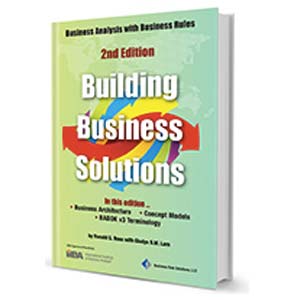Decision Rules vs. Behavioral Rules
Extracted from Decision Analysis — A Primer: How to Use DecisionSpeak™ and Question Charts (Q-Charts™), by Ronald G. Ross, 2013, available (free) at www.brsolutions.com/IPSpeakPrimers
An operational business decision focuses on determining the best or most appropriate answer to an operational business question.
For a particular matter (case) the question generally needs to be answered only once ("for real") at some particular point in time. Consequently, the relevant decision rules are likely to be evaluated only at a single point of determination.
Example:
Consider the operational business decision What should be charged for shipping an order? For any particular order all decision rules relevant to the decision might be evaluated only when that order is taken.
Behavioral rules in contrast:
- Do not pertain directly to determining the best or most appropriate answer (outcome) among alternatives. Instead, they are about guiding or shaping on-going business activity — i.e., behavior.
- Usually need to be applied at multiple points of determination for the very same matter. Their purpose is to prevent undesirable situations that could occur at any of various (multiple) points in time.
These differences from decision rules are pronounced. Three simple (but typical) examples illustrate.
Example 1.
Behavioral Rule: A customer that has ordered a product must have an assigned agent.
This business rule:
- Is not about selecting the most appropriate agent for a customer — i.e., not about the decision, Who is the most appropriate agent for a customer?
- Does not apply only at a single point of determination — e.g., when an order is taken.
- Instead, the business rule is meant to be enforced continuously — for example, even if the agent assigned to a customer retires or leaves the company.
Example 2.
Behavioral Rule: A work group posted to a union site must include a union liaison.
This business rule:
- Is not about selecting the most appropriate work group to post to a site — i.e., not about the decision, What work group should be posted to a union site?
- Does not apply only at a single point of determination — e.g., when a posting occurs.
Instead, the business rule is meant to be enforced continuously — for example, if the current union liaison drops out of a work group, or if a non-union site to which a work group is posted subsequently becomes union.
Example 3.
Behavioral Rule: A student with a failing grade must not be an active member of a sports team.
This business rule:
- Is not about selecting the most appropriate sports team for a student — i.e., not about the decision, Which sport team is best for a student?
- Does not apply only at a single point of determination — e.g., when a student joins a team.
- Instead, the business rule is meant to be enforced continuously — for example, if a student who is already active on some sports team should let his or her grades fall.
The Bottom Line
Business rules like the three in these examples generally fit no particular pattern. For that reason they cannot be effectively managed in a decision table along with other parallel rules.
Instead, they need to be expressed as individual business rule statements following appropriate conventions (e.g., RuleSpeak®). Your organization has hundreds or thousands of such business rules.
Decision rules and behavioral rules are fundamentally different.
- Decision rules simply produce answers; behavioral rules indicate what you must or must not do. (Behavioral rules always carry the sense of obligation or prohibition.)
- Decision rules can usually be applied at a single point of determination; behavioral rules usually apply at multiple points of determination.
These differences are stark. Many approaches gloss over them, or ignore them completely, causing great harm. Avoid force-fitting a decision-oriented approach to every business rule problem. It simply doesn't work!
# # #
About our Contributor:
Online Interactive Training Series
In response to a great many requests, Business Rule Solutions now offers at-a-distance learning options. No travel, no backlogs, no hassles. Same great instructors, but with schedules, content and pricing designed to meet the special needs of busy professionals.










How to Define Business Terms in Plain English: A Primer
How to Use DecisionSpeak™ and Question Charts (Q-Charts™)
Decision Tables - A Primer: How to Use TableSpeak™
Tabulation of Lists in RuleSpeak®: A Primer - Using "The Following" Clause
Business Agility Manifesto
Business Rules Manifesto
Business Motivation Model
Decision Vocabulary
[Download]
[Download]
Semantics of Business Vocabulary and Business Rules